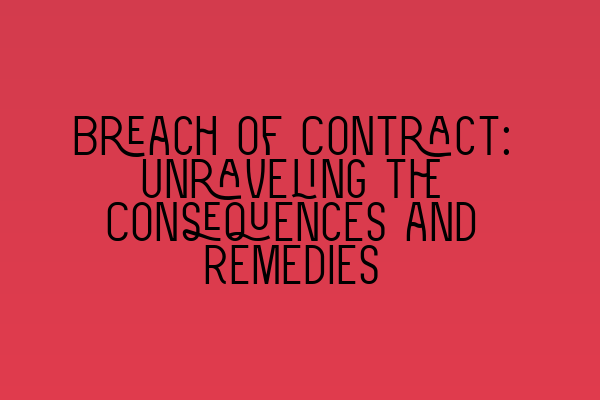Breach of Contract: Unraveling the Consequences and Remedies
In the world of contract law, parties enter into agreements with the expectation that both sides will fulfill their obligations as outlined in the contract. However, there are times when one party fails to adhere to their contractual duties, resulting in a breach of contract. Understanding the consequences and remedies for breach of contract is essential for both solicitors and anyone involved in business dealings. In this blog post, we will explore the intricacies of breach of contract and shed light on the available remedies.
What is a Breach of Contract?
A breach of contract occurs when one party fails to perform their obligations under the terms and conditions outlined in the contract. This breach can take various forms, including non-performance, incomplete performance, or performing in a manner inconsistent with the contractual terms. It is important to note that not all breaches are equal, and the consequences can vary depending on the severity of the breach.
Consequences of Breach of Contract
When a breach of contract occurs, it can have significant consequences for both parties involved. The non-breaching party may suffer financial losses, damages to their reputation, and a disruption to their business operations. Conversely, the party in breach may face legal action, financial penalties, and damage to their standing in the industry.
Remedies for Breach of Contract
When faced with a breach of contract, it is important to understand the available remedies. These remedies can provide the non-breaching party with a means of seeking compensation or enforcing the performance of the contract. Let’s explore some of the common remedies for breach of contract:
1. Damages: This is the most common remedy for breach of contract. Damages aim to compensate the non-breaching party for any losses suffered as a result of the breach. There are two types of damages: compensatory damages, which aim to restore the non-breaching party to the position they would have been in if the breach had not occurred, and consequential damages, which cover any additional losses resulting from the breach.
2. Specific Performance: In situations where monetary compensation is not an adequate remedy, the non-breaching party may seek specific performance. This remedy requires the breaching party to fulfill their obligations as outlined in the contract. Specific performance is often sought in cases involving unique or irreplaceable goods or services.
3. Rescission: Rescission allows the non-breaching party to cancel the contract and be released from their obligations. This remedy is typically sought in cases where the breach has fundamentally undermined the purpose of the contract, or if the breaching party engaged in fraudulent or deceitful behavior.
4. Injunction: Injunctions are court orders that prohibit a party from taking certain actions or require them to perform specific acts. This remedy is commonly sought when monetary damages are not sufficient to rectify the breach. Injunctions can be temporary or permanent, depending on the circumstances of the case.
5. Liquidated Damages: In some contracts, the parties may include a provision that establishes predetermined damages in the event of a breach. These liquidated damages provide a pre-determined amount of compensation, making it easier to quantify the losses suffered due to the breach. However, it is important to ensure that the liquidated damages are reasonable and proportionate to the potential harm caused by the breach.
Conclusion
Breach of contract is a serious matter that can have far-reaching consequences for all parties involved. Understanding the consequences and remedies for breach of contract is essential for both solicitors and individuals engaged in contractual agreements. By familiarizing yourself with the available remedies, you can effectively navigate the complexities of contract law and protect your interests in the event of a breach.
If you found this article helpful, you may also be interested in these related articles:
– Mentorship for Aspiring Solicitors: Nurturing Talent in the Legal Field
– Legal Challenges and Pitfalls: Navigating the Complexities of the Legal System
– The GDL (Graduate Diploma in Law): A Pathway to Becoming a Solicitor
– Mastering the Solicitor’s Path: Prepare for the Journey Ahead
– The Benefits of Becoming a Solicitor: A Rewarding Career
Remember, consulting with a qualified solicitor is crucial when dealing with breach of contract cases or seeking legal advice. They will be able to guide you through the legal process and help you navigate the complexities of contract law.
